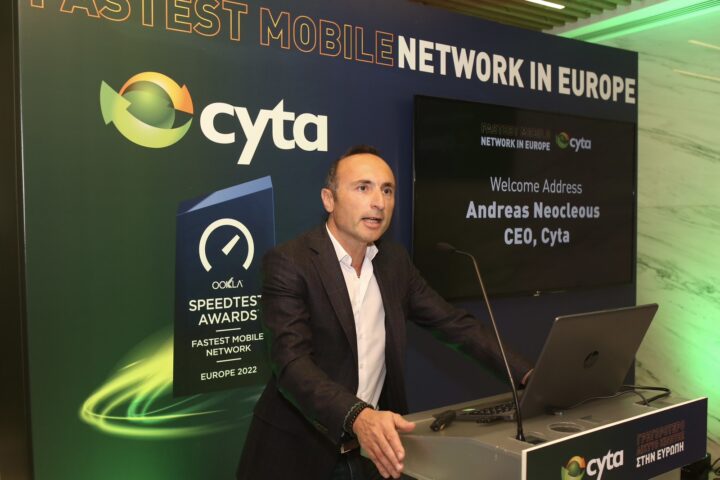Authorities are hopeful the island’s pioneering leap into the 5G era will go a long way in catching up with the rest of the world on the digital transformation train before leaving the station.
However, stakeholders warn that building a super-fast internet network does not mean much without technological applications on the ground.
The Cyprus Telecommunications Authority said the island is already surfing with 5G speeds as coverage is currently 96%, expected to be 100% by the end of March.
In comments to the Financial Mirror, Andreas Neocleous, Cyta CEO, said that thanks to its 5G network, Cyprus will be the first EU country stepping into the new era.
“Shortly before the end of 2021, thanks to CyTA, Cyprus has the fastest mobile network in Europe, and at the beginning of 2022, it will become the first country in the EU with 100% 5G population coverage,” said Neocleous.
He argued that access to high-speed internet from anywhere in Cyprus, with speeds up to 20 times faster than today, could be crucial to how competitively the country emerges from the economic ruins of the COVID-19 pandemic.
“5G offers a unique opportunity for the development of rural and mountainous areas, with positive effects on the economy and quality of life.”
He said the 5G network is the basis of future technologies, such as smart cities and smart factories, enhancing medical care for people in remote areas. They will have virtual and instant access to specialist doctors.
Necoleous added that the 5G network would need the support of a land-fast internet network, which is why it is speeding up the CytaFiber (fibre optic) network, connecting 200 homes and businesses every day.
“By the end of 2023, it will have covered all the urban areas of Cyprus, significantly upgrading the quality of our customers’ services.
“Some 250,000 homes can have access to the network”.
Cyta’s CEO said that authorities had made advancements in connecting the island with the rest of the world.
“Next February, the new “Arsinoe” submarine cable system will be put into operation, which connects Europe with Asia through Cyprus and will upgrade the capacity of our country’s internet connections with abroad.”
He argued that the digital upgrade would enhance the economy and society while putting Cyprus on the map as an international data hub, turning into a pole of attraction for local and international companies.
Neocleous said the majority of 5G ready mobile phone users should be able to see the difference in downloading and uploading speeds, as the network offers up to 20 times faster connections compared to 4G.
Download speeds could reach 500 Mbps to even 1 Gbps, up from 20 to 30 Mbps offered by 4G connections.
“At the moment, the benefits of having a 5G network are limited mostly to entertainment, with users having the ability to stream movies and upload their data much faster.
“However, this network will be the basis for all technological developments of the next decade.”
More providers
Cyprus should see another three 5G networks coming online in the coming months, as four frequency licenses were issued to Primetel, Epic and Cablenet, who bid for the licenses.
Radiofrequency licensing for 5G networks is an obligation for all EU states to reach the ‘Gigabit Society’ goal set by the European Commission.
Meeting this goal will help Europeans and businesses reap the full benefits of digitalisation, enhancing EU competitiveness in the global market, accelerating digital transformation, and promoting green growth.
Good news
The development has been welcomed by the Commissioner for Communications, George Michaelides, despite a considerable delay.
“We had laid out the framework for stepping into the 5G era back in 2017 and had expected to see the network going live much earlier,” Michaelides told the Financial Mirror.
The commissioner also noted the lack of applications to help Cyprus make the most of the network.
“For Cyprus to reap the fruit of having 5G, we will need to see applications on the ground that will facilitate remote learning and telemedicine.
“We want to see applications that will allow health care professionals to evaluate, diagnose and treat patients in remote areas such as Pyrgos and Polis Chrysochous.”
Michaelides explained that his authority would like to see people living in remote areas not travelling for several hours to reach a hospital for a basic check-up.
“Having solutions employing 5G technologies allowing doctors to examine patients remotely will go a long way in improving the quality of life for these people.
“But we need technological solutions on the ground such as stethoscopes and ultrasound equipment that can be accessed remotely.”
And 5G could also benefit agriculture as automated procedures controlled remotely could boost productivity.
“Greece’s agriculture sector has begun to adopt 5G technological solutions to monitor multiple drivers affecting their bottom line, including temperature, watering and collecting data on soil conditions.”
Internet of things
The University of Nicosia CEO and professor in Digital Currency, Antonis Polemitis, said Cyprus should invest in 5G applications and e-governance platforms or having a high-speed network is redundant.
“We certainly welcome the steps taken by providers and hope more is done to push things forward”.
Polemitis argued that technological advancements and communication would soon rely on augmented and virtual reality.
“We will no longer be having teleconferences in front of screens.
“With technological advancements facilitated by faster connections, it will feel like your interlocutor is in the same room with you.”
The UNIC CEO believes a lot needs to be done to promote the digitalisation of the economy and government before moving on to the next level of technological advancements.
In Dubai, when one rents a flat, the contract is signed online, with all utility bills automatically transferred to the tenant.
“The new tenant can move in immediately, not having to visit a single office to connect the electricity or transfer the water bill under their name. Unfortunately, this is not the case in Cyprus.
“One of the areas we are lagging in is e-governance, an area where we have a lot to do, starting from the simplest things such as digitising government and other services.
“You cannot move into the digital era when your data is still in box-files.
“And then you have the internet of things, with the interconnection via the Internet of computing devices embedded in everyday objects, enabling them to send and receive data”.
This is where 5G technologies come into play as a fast network relies not only on cables.
Polemitis believes Cyprus should have been at the forefront of digitalising its economy, compared to other countries.
“A task not so hard to achieve, basically all it would take is to invest in the latest technology available and enhancing people’s digital skills.
“But work and planning need to go into it.”










